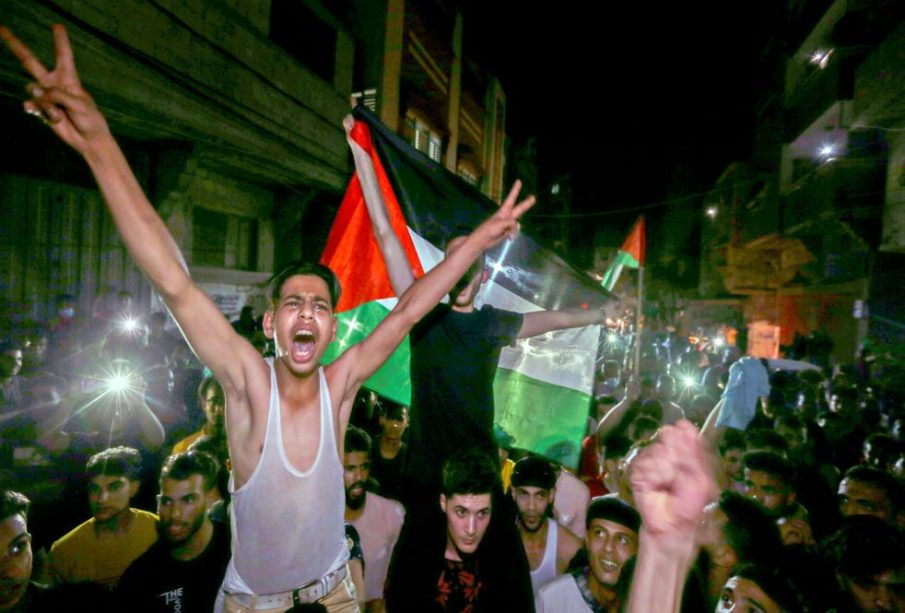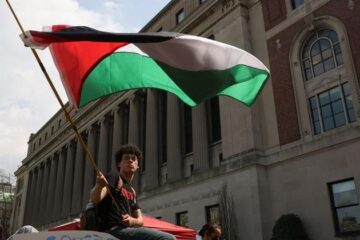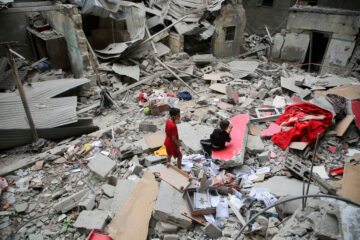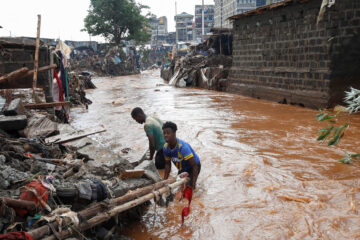Palestinians claim victory as Gaza truce faces early test
 Palestinians celebrate in the streets following a ceasefire, in the southern Gaza Strip. (REUTERS)
Palestinians celebrate in the streets following a ceasefire, in the southern Gaza Strip. (REUTERS)Palestinians rallied by the thousands early Friday after a cease-fire took effect in the latest Gaza war, with many viewing it as costly but clear victory for the Islamic militant group Hamas over a far more powerful Israel.
The 11-day war left more than 200 dead — the vast majority Palestinians — and brought widespread devastation to the already impoverished Hamas-ruled Gaza Strip. But the rocket barrages that brought life to a standstill in much of Israel were seen by many Palestinians as a bold response to perceived Israeli abuses in Jerusalem, the emotional heart of the conflict.
The truce faces an early test on Friday, when tens of thousands of Palestinians attend weekly prayers at the Al-Aqsa Mosque compound in Jerusalem, a flashpoint holy site revered by Jews and Muslims. Celebratory protests could spark confrontations with Israeli police, setting in motion another cycle of escalation like the one that led to the war.
Thousands took to the streets of Gaza as the cease-fire took hold at 2 a.m. Young men waved Palestinian and Hamas flags, passed out sweets, honked horns and set off fireworks. Spontaneous celebrations also broke out in east Jerusalem and across the occupied West Bank.
The mood was more somber in Israel, where Prime Minister Benjamin Netanyahu faced angry accusations from his right-wing base that he had halted the war too soon.
Like the three previous wars between the bitter enemies, the latest round of fighting ended inconclusively. Israel claimed to have inflicted heavy damage on Hamas with hundreds of bruising airstrikes but once again was unable to halt the rockets.
Hamas also claimed victory, despite the horrifying toll the war took on countless Palestinian families who lost loved ones, homes and businesses. It now faces the daunting challenge of rebuilding in a territory already suffering from high unemployment and a coronavirus outbreak.
The cease-fire was brokered by neighboring Egypt after the U.S. pressed Israel to wind down the offensive. Netanyahu announced that Israel had accepted the proposal late Thursday, while emphasizing that “the reality on the ground will determine the future of the campaign.”
U.S. Secretary of State Antony Blinken plans to visit the region in the coming days “to discuss recovery efforts and working together to build better futures for Israelis and Palestinians.” the State Department said.
The fighting began on May 10, when Hamas militants in Gaza fired long-range rockets toward Jerusalem. The barrage came after days of clashes between Palestinian protesters and Israeli police at Al-Aqsa. Heavy-handed police tactics at the compound, and the threatened eviction of dozens of Palestinian families by Jewish settlers had inflamed tensions.
The competing claims to Jerusalem lie at the heart of the Israeli-Palestinian conflict and have repeatedly triggered bouts of violence in the past.
Hamas and other militant groups fired over 4,000 rockets at Israel throughout the fighting, launching the projectiles from civilian areas at Israeli cities. Dozens of projectiles flew as far north as Tel Aviv, the country’s bustling commercial capital.
Thousands gathered Friday morning in the southern Gaza Strip town of Khan Younis outside the family house of Mohammed Deif, the shadowy Hamas commander who had ordered the rocket attacks. Supporters shouted “victory” and waved green Hamas flags.
Israel, meanwhile, carried out hundreds of airstrikes targeting what it said was Hamas’ military infrastructure, including a vast tunnel network.
At least 230 Palestinians were killed, including 65 children and 39 women, with 1,710 people wounded, according to the Gaza Health Ministry, which does not break the numbers down into fighters and civilians. Twelve people in Israel, including a 5-year-old boy and 16-year-old girl, were killed.
The United States, Israel’s closest and most important ally, initially backed what it said was Israel’s right to self-defense against indiscriminate rocket fire. But as the fighting dragged on and the death toll mounted, the Americans increasingly pressured Israel to stop the offensive.
In a rare public rift, Netanyahu on Wednesday briefly rebuffed a public call from President Joe Biden to wind things down, appearing determined to inflict maximum damage on Hamas in a war that could help save his political career.
But late Thursday, Netanyahu’s office announced the cease-fire agreement. Hamas quickly followed suit. Militants continued to launch sporadic rocket at Israel early Friday, before the 2 a.m. cease-fire took effect.
In Washington, Biden hailed the cease-fire. “I believe we have a genuine opportunity to make progress, and I’m committed to working for it,” he said.
Biden said the U.S. was committed to helping Israel replenish its supply of interceptor missiles for its Iron Dome rocket-defense system and to working with the internationally recognized Palestinian Authority — not Hamas — to provide humanitarian aid to Gaza.
Netanyahu quickly came under heavy criticism from members of his hawkish, nationalist base. Gideon Saar, a former ally who now leads a small party opposed to the prime minister, called the cease-fire “embarrassing.” Itamar Ben Gvir, head of the far-right Jewish Power party, tweeted that the cease-fire was “a grave surrender to terrorism and the dictates of Hamas.”
In a potentially damaging development for the Israeli leader, the Palestinian militants claimed Netanyahu had agreed to halt further Israeli actions at the Al Aqsa Mosque and to call off the planned evictions of Palestinians in the nearby Sheikh Jarrah neighborhood.
An Egyptian official said only that tensions in Jerusalem “will be addressed.” He spoke on condition of anonymity because he was discussing behind-the-scenes negotiations and provided no details.
Hamas and the smaller Islamic Jihad militant group declared victory, but both appear to have suffered significant losses. The two groups said at least 20 of their fighters were killed, while Israel said the number was at least 130 and probably higher.
Some 58,000 Palestinians sought shelter in crowded United Nations schools at a time of a coronavirus outbreak. They began returning to their homes as the truce took hold.
Since the fighting began, Gaza’s infrastructure, already weakened by a 14-year blockade, has rapidly deteriorated, and airstrikes have damaged schools and health centers.
Medical supplies, water and fuel for electricity are running low in the territory, on which Israel and Egypt imposed the blockade after Hamas seized power from the Palestinian Authority in 2007. Since then, Palestinian President Mahmoud Abbas has governed autonomous areas of the Israeli-occupied West Bank and has limited influence in Gaza.
SOURCE: AP











